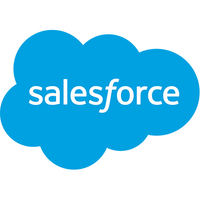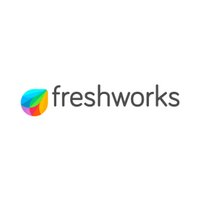Best CRM for small business of 2025
Customer relationship management software to improve your small business

We list the best CRM for small business, to make it simple and easy to set up and manage a contact platform for customers, staff, and suppliers.
Customer Relationship Management (CRM) software’s primary goal is to help small businesses foster better relationships with customers. Simple enough. But with so many CRM platforms coming with countless tools and features, including lead generation, contact management, and more, it can be hard to know which one meets your small business’ needs.
Our experts have spent hundreds of hours testing some of the best CRM software on the market. Now we have applied our experience and expertise to create this guide, helping you find the best CRM based on the unique needs of your small business.
Reader Offer: 30-day free trial
Salesforce's CRM software helps businesses maximize customer data with features like lead scoring, omnichannel routing (which directs customer inquiries to the right agent across multiple channels), advanced pipeline management, and deal health insights. It's the ideal solution for companies looking to boost customer relationships and optimize sales processes.
Preferred partner (What does this mean?)
Our top 3 best CRM for small business
Why you can trust TechRadar
1. Best for most small businesses, in most cases: Salesforce
Salesforce is the go-to CRM for many small businesses and for good reason. The platform can't be beaten on its strong combination of ease-of-use, pricing, and extensive range of tools and features.
↪ Read our expert analysis of Salesforce
2. Best value for money: Freshsales
Most small businesses aim to make the most from their budget. With plan starting from just $7/mo, Freshsales offers users excellent value for money.
Those who work in small businesses often have a wear many hats and spin many plates. Zoho's intuitive CRM platform helps minimize the time spent on getting to grips with a new platform - freeing up time to focus on other valuable activities.
The best CRM for small business of 2025 in full:
Best CRM for small business overall
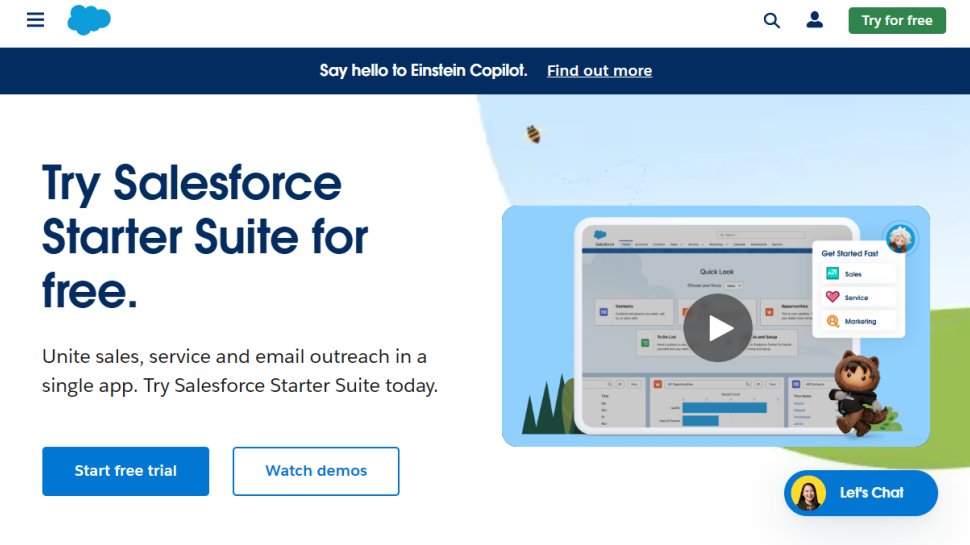
Reasons to buy
Reasons to avoid
While Salesforce is perhaps best known as the market-leading CRM giant adept at managing the operations of enterprise-level businesses, it offers solutions for small businesses too.
Providing an all-in-one solution to your sales, service, and marketing needs, Salesforce offers competitive plans for smaller businesses with its Small Business Pricing Solutions. The Essentials package provides both sales and customer service in one simple app for just $25 per user a month. This means smaller businesses can enjoy the power of market-leading CRM at a lower price.
Overall, the Salesforce interface is intuitive and sales-focused, but you can customize features like dashboards and reports to match your business needs and personalize your user experience. The CRM also boasts additional features to streamline your sales and business processes, including internal communication tools like on-screen calls, the easy creation of a client knowledge base, data export, email templates, and third-party tool integration with apps like Slack.
Find out more by reading our full Salesforce Service Cloud review.
Best CRM for small business for value for money
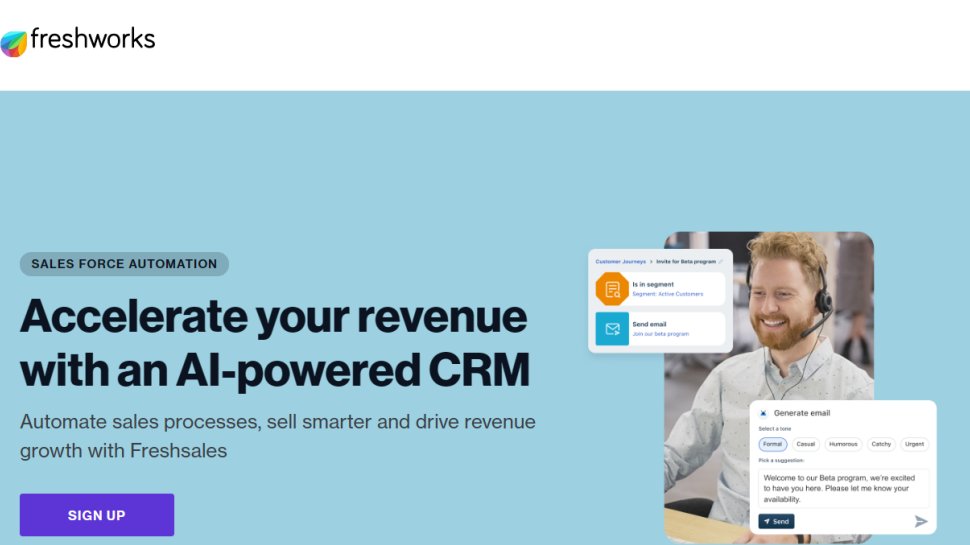
Reasons to buy
Reasons to avoid
Freshsales provides a variety of tools that make it simple for small- and mid-sized businesses to support their clients, understand customer intent, and efficiently convert leads into sales.
A combination of the Freshworks automation software, the Freshsales suite is all-in-one CRM software that unites sales and marketing.
Utilizing the intelligent Freddy AI assistant, the Freshsales provides transparent insights into customer engagement, helping businesses discover leads, close deals, and nurture client relationships. The software also has an intuitive, user-friendly interface on both desktop and mobile, providing fast access to client records and communications.
Third-party tools, including popular email clients Gmail and Microsoft Outlook, are also easily integrated, allowing you to create bulk email templates while monitoring both sent and received communications to prospective clients. Businesses can also utilize the built-in call feature to automatically update client records.
While the CRM is lacking lead generation tools like business card scanners, it provides customizable web forms to capture lead data from your business website—ideal for smaller businesses looking to grow their client base.
Read our full Freshsales review.
Best CRM for small business for ease-of-use
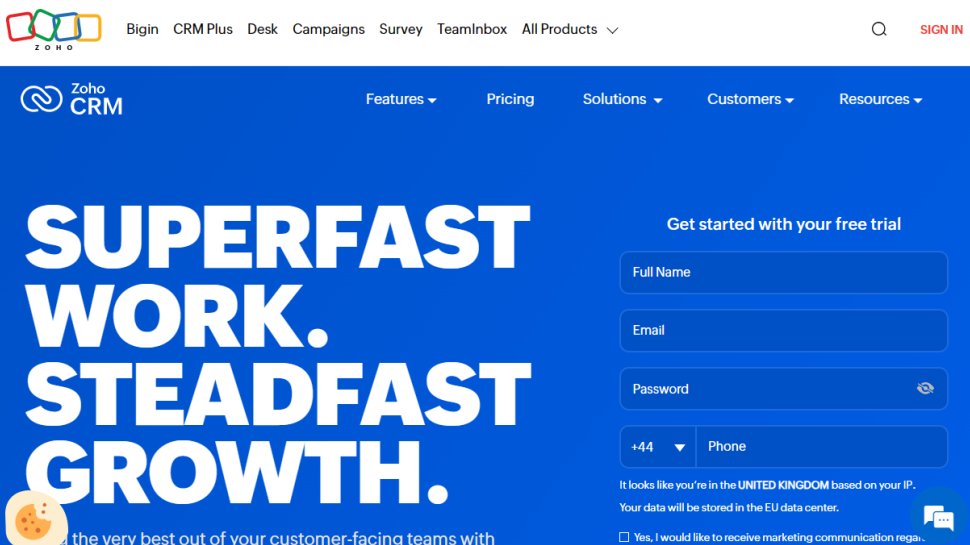
Reasons to buy
Reasons to avoid
Powerful cloud-based CRM software boasting excellent customer management and lead generation tools, Zoho CRM is well-equipped to assist in running a small business.
While the platform is very easy to use, making it one of the best CRMs for startups, it doesn’t compromise on capability—the software features the ability to search social media and LinkedIn to capture new customer contacts, scan business cards, and provide automated workflows to assist sales teams. Alongside this, you can benefit from reporting, client contact and communication records, website visitor segmentation, and pipeline management.
The main pro to the CRM, however, is the seamless integration with other Zoho tools, including the Zoho sales, marketing, and project management suite, Zoho Invoice, and Zoho Campaigns. Overall, Zoho CRM can be pricey, but with a solid free plan.
Check out our full Zoho CRM review.
Best free CRM for small business
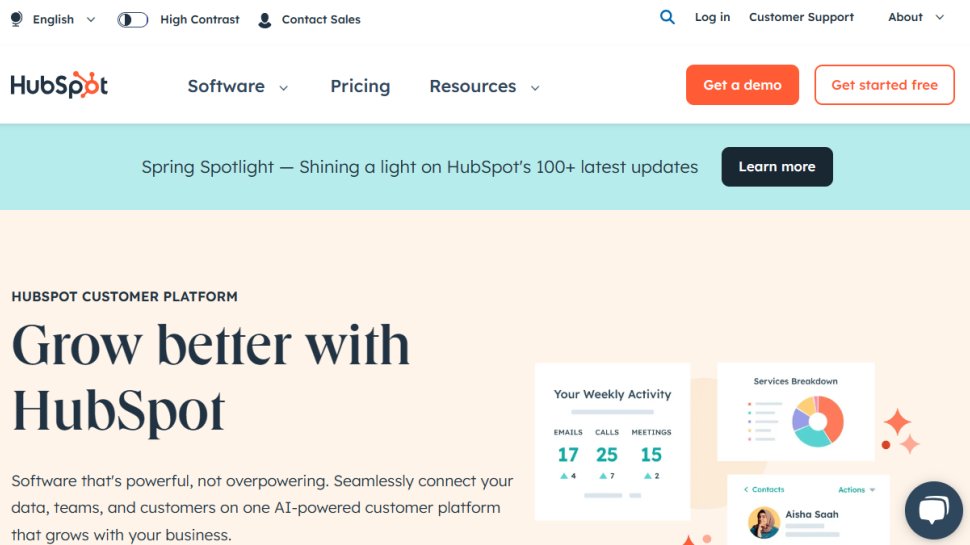
Reasons to buy
Reasons to avoid
HubSpot is an ideal CRM solution for small businesses just starting out. While there are several paid plans, you can also get started free of charge with a lightweight yet powerful version of the CRM software.
Users of the free HubSpot CRM can benefit from highly capable client database software to assist in managing and maintaining new leads, with dashboard reporting, company insights, deal tracking, and pipeline management—all of which are portrayed simply via the user-friendly interface.
A wide range of free tools is also at your disposal to organize your customer journey, including email tracking and templates, on-screen calling, and contact management. Plus, you can enjoy integration from over 300 third-party apps like Slack, Stripe, Mailchimp, and as well as with lead-generation software.
If you fancy upgrading from the free plan, both the Sales and Marketing Hubs start at $45 a month for two users, with additional features like task automation notifications and conversation routing included.
Read our full HubSpot CRM review.
Best CRM for small business for sales
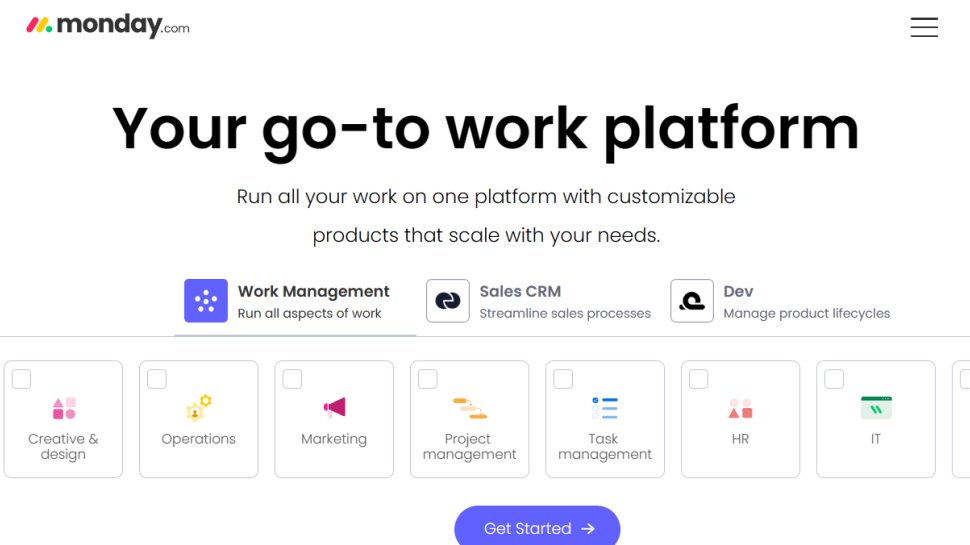
Reasons to buy
Reasons to avoid
If you're a sales and marketing leader, Monday Sales CRM is the perfect CRM platform for you. It's easy to use and has lots of tools to help you manage your customer journey. Plus, you can customize the software to fit your needs. You can send and receive emails, take notes during meetings, and view all your communications on one timeline.
The main feature is managing contacts, which helps you keep track of all your clients and potential clients in one place. Yes, in fact, all of your clients can be monitored as this solution doesn't place an upper limit on the number of clients it can manage, so this is a solution that can certainly grow with your business. Plus, you get email support with templates that save you time by automatically filling out personalized emails.
Automation is another great feature that businesses can take advantage of. It can help you create custom workflows to get rid of admin stuff and make communication easier, but you'll need a plan that's higher than the basic one. But if you don't upgrade to a higher plan, you'll only be able to do 250 activities a month.
Monday CRM has four different plans. Each plan has to have at least 3 seats, so it's not great for solo businesses as you will have to pay for seats that are unused. There's no free trial, but you can try it for two weeks and get 18% off if you pay annually.
Read our full Monday Sales CRM review.
Best CRM for small business for Gmail
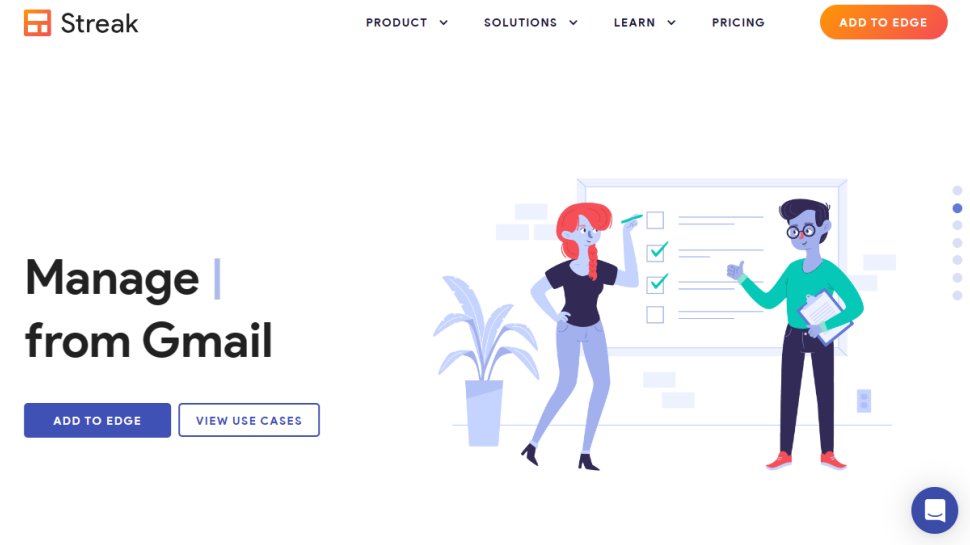
6. Streak CRM for Gmail
Reasons to buy
Reasons to avoid
For existing users of Gmail and Google Workspace, Streak is the simplest CRM to incorporate into the daily operations of your small business. It is built directly into Gmail, so you can work from your inbox and enjoy integration with other Google Workspace apps like Google Sheets, Google Docs, Google Drive, and Chat to help keep all your data accessible and in one place.
Streak CRM allows you to track client emails, manage contacts, monitor leads, and keep on top of your sales funnel. You can capture leads directly from your contacts, track and share client interactions, easily import or export data, create custom pipelines, and set tasks and reminders, among other things.
With a forever-free plan offering basic CRM to individual professionals, Streak CRM is highly affordable for single professionals or small teams and businesses. However, it can get pricey if you’re working within a larger team.
Best CRM for small business for user experience
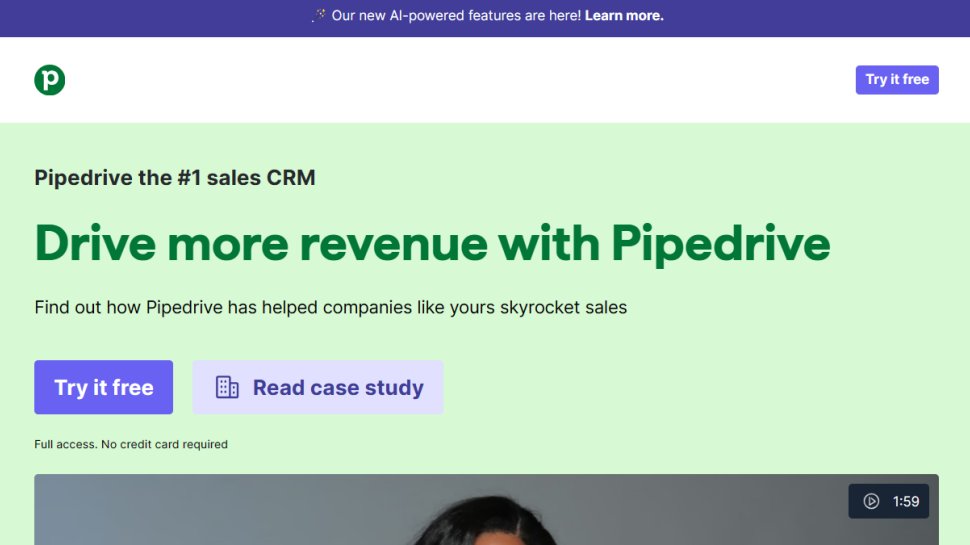
Reasons to buy
Reasons to avoid
Pipedrive is a popular CRM tool that’s affordable and thus suitable for small businesses with limited budgets. There’s no free plan, which is a drawback, but there’s a 14-day free trial period that you can start without inputting card details.
Pipedrive boasts of being a CRM “designed by salespeople, for salespeople”. True to its claim, you can do many things with this CRM. To start, you can set up your sales pipeline with ease; you may build a new template or use an existing one. Afterward, you can add deals to the pipeline or import them from a CSV spreadsheet. After adding the deals, you can always monitor the progress up until the deal closes.
You can set up automatic alerts and reminders on Pipedrive to keep you on top of the deals. If a deal closes, the platform will automatically update your sales forecast to reflect it. Like many modern tools, Pipedrive incorporates some aspects of artificial intelligence that let users automate mundane sales tasks.
This CRM is good for collaboration, so you can set up accounts for your staff to work together to close sales deals. As the administrator, you can always monitor their progress and remind them if they’re falling behind. You can create web forms using Pipedrive and embed them on your website to gather leads. The platform provides form templates designed by professionals, which you can edit to fit your tastes.
Pipedrive gives you detailed reports on your activities or that of your staff. However, we observed a pattern of customer complaints of the reporting features lacking depth and needing improvement.
Read our full Pipedrive CRM review.
Best CRM for small business for project management
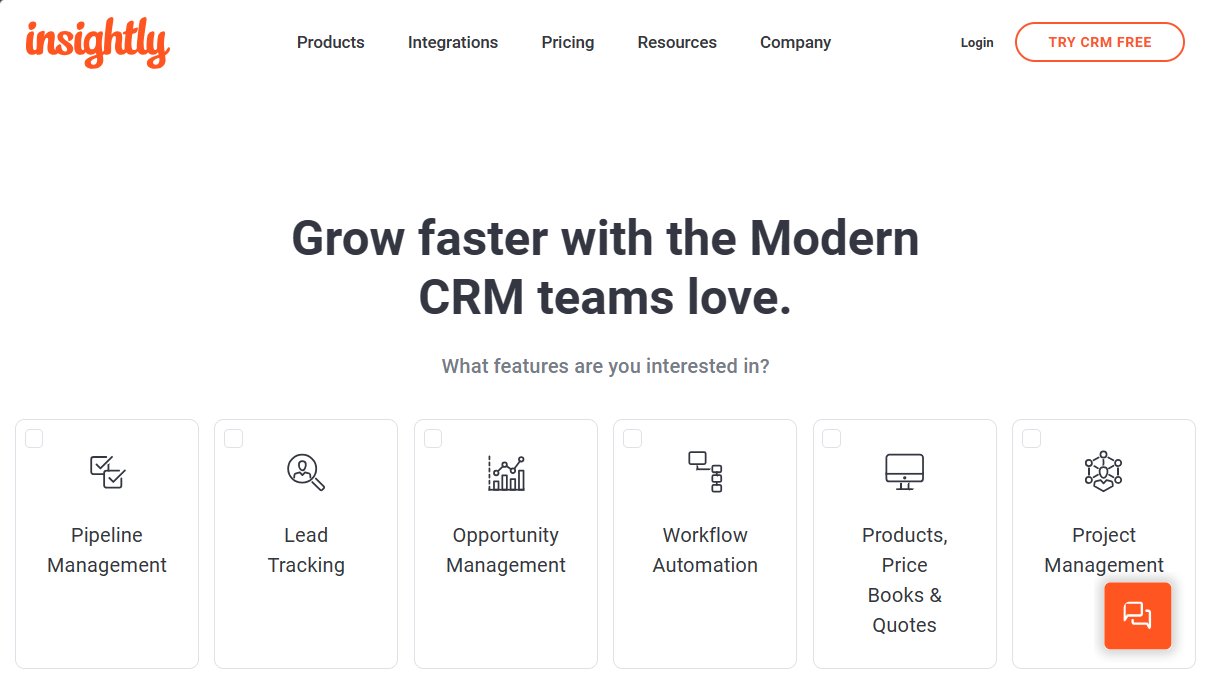
Reasons to buy
Reasons to avoid
Insightly is a CRM platform that lets you handle all your sales functions. You can create custom workflows for your sales deals and track them as you progress toward closing the deal. You can create or update records and generate tasks for other users within your organization to handle.
You can send emails to your leads and customers right within Insightly because it has integrations with email clients. The platform tracks the delivery of your emails and reports back important data such as open and click-through rates.
As a business owner, you have a great deal of control over what your staff can do on this CRM. You can set special permissions and visibility levels for each user or according to role or department. For example, normal employees may not be able to view detailed sales reports, while executives can.
Another good thing about Insightly is that you can use workflow automation to automate a lot of mundane sales tasks. For example, you can set it to send an automatic email once a lead reaches a specific stage of your deal. You can also automatically update your sales forecast after closing a deal. These are just some examples of how your sales team can save time to be put to better use elsewhere. Creating these workflow automations requires a bit of technical knowledge, but it’s not as complex as typical programming.
What customers mostly highlight about Insightly is its extensive integrations with third-party tools. The platform is second to none in this category. You can link your Insightly CRM profile with many other tools for additional functionality. For example, you can link it to your BambooHR account to sync employee records with corresponding user profiles on Insightly or link it to your Shopify account to automatically capture customer details from your online store and add them to Insightly.
The main drawback we observed is that Insightly charges extra money for phone support, unlike most rivals. Without paying, you’re stuck with email support, which is much slower than phone support.
Read our full Insightly review.
Best CRM for small business for tracking
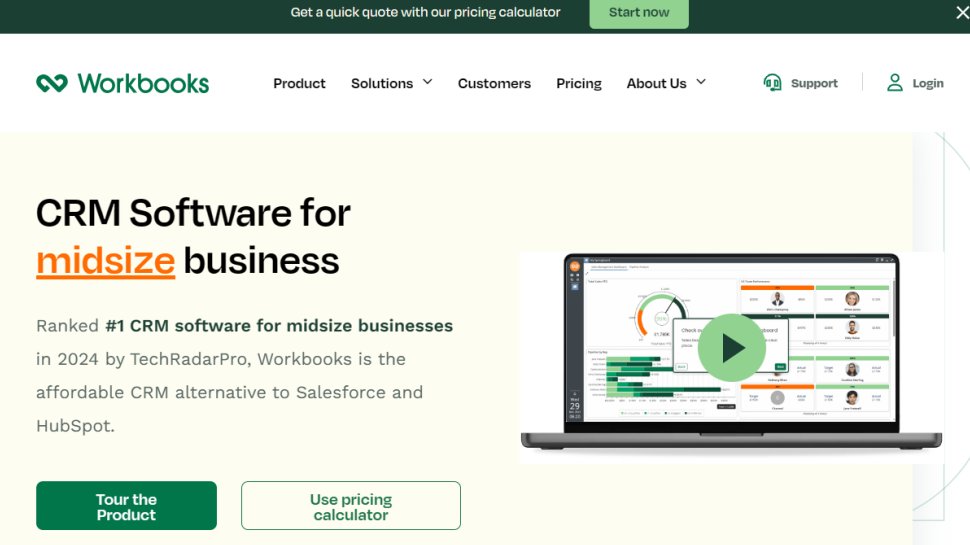
Reasons to buy
Reasons to avoid
Workbooks is another good CRM for small businesses. It enables you to track sales and interact with customers within one platform. You can use it to record and keep track of sales activities and ensure that no part of them is overlooked.
Workbooks is very good at contact management; you could use every interaction with your lead or customer to capture knowledge about them and map relationships. You can also segment customers according to different factors and interact with each segment better.
This platform provides tools to track your business’s finances closely. For example, you can track all your suppliers and their prices and record every communication you make with them. You can also create supplier contracts within the dashboard and keep track of each one. Likewise, you can create professional sales quotes to send to clients and track their status are they're fulfilled.
The area where Workbooks shines most is in its reporting features. The platform makes it easy to generate detailed reports that give you great insight into your sales pipeline. For example, the reports can help you identify which market segments and products are giving you the highest revenue. You can also easily monitor which salespeople in your organization are hitting or missing their targets.
The main drawback with this platform is that it has limited integrations with third-party software, unlike a rival like Insightly.
Read our full Workbooks review.
Honorable mentions
While the above list represents (in our view) the best CRMs for small businesses available today, during our testing we encountered a number of others that were certainly worthy candidates. With that in mind, here are our best of the rest:
Flowlu: This all-in-one CRM has a range of features, including many of those small businesses are likely to requires, including project management features that are especially useful if you employ Agile methodologies. In addition to its free plan, Flowlu's cheapest alternative starts from $39 for 8 users, which works out a reasonable $4.87 per user per month.
Capsule: Boasting an intuitive user interface and a clear, easy-to-understand dashboard, Capsule makes it easy for businesses to organize and manage projects. Offering a range of integrations and robust reporting, Capsule is only really let down by inadequate support.
NetHunt: If your small business relies on Gmail, NetHunt could be the CRM for you, as it boasts an entirely separate dashboard for the email client. However, fear not if you mainly engage with customers over other channels, as NetHunt support chatting via WhatsApp and Telegram too.
Best CRM for small business FAQs
How to choose the best CRM for small business
Ultimately, choosing the best CRM for small business depends on your needs—does software with more cost-effective pricing take precedence, or are the higher levels of personalization and efficiency that often come with a pricier plan more important?
For instance, Salesforce would be better suited to businesses undeterred by the higher costs associated with the higher levels of customization on offer. It can also expand with your business, while less efficient CRM platforms like Hubspot may struggle to keep up with demand as your business grows. Those looking for an easily-integrable, simple, and affordable CRM solution may want to consider Streak instead.
Overall, ease of use is an important factor to consider. CRM software is something that will be incorporated into the daily operations of your business, so you’ll want something that you and your colleagues can hit the ground running with—there’s no point investing in a technical CRM if no-one can understand it.
You’ll also want to consider the features most beneficial to your daily operations, like project management features, lead generation tools, and third-party app integration, as the focus of each CRM software can differ.
How we tested the best CRM for small business
When finding areas of focus for reviewing CRM software, we look at key components to determine the overall quality of the user experience. We examine aspects like pricing by examining the plans that are available, how many users these allow, and whether any other additional costs are involved.
We also look at the software features that would make your work life easier; reporting, automation, client management, and AI tool integrations, and whether there is adequate customer support on-hand to assist with this.
Other important areas in our reviews are software usability and support; is the interface user-friendly and intuitive? If you were to get stuck, is immediate support available 24/7, or will responses take two to three working days? By examining aspects like this, we can determine the overall user experience of the software and make informed recommendations.
Read how we test, rate, and review products on TechRadar.
FAQs
While determining the best CRM for small businesses will depend on individual priorities, the software options presented in this buying guide are all strong contenders for small businesses—though ultimately, the size of your small business will likely determine the best option.
For instance, Streak CRM and HubSpot both offer free plans which would suit individual professionals or businesses just starting out, while Freshworks prides itself on being a good all-rounder for small- to mid-sized businesses. Zoho would provide an ideal CRM for existing users of the Zoho Suite, while Salesforce leads the way overall as the CRM industry giant.
What does a CRM do?

Contact / lead management
Storing prospect details to nurture relationships are at the core of a CRM system. Integrations with contact apps and social media accounts are a plus, maximizing lead information for sales teams.

Deal management
When a sales opportunity is identified, deal management optimises team productivity, making a deal more likely. Deal management can include setting milestones, tasks, and deadlines.

Workflow automation
Automation ensures critical tasks are done and you save time. For example, email templates can be scheduled to go out to prospects when they reach a certain stage in the sales funnel.

Bulk emails
Bulk emails can initiate and advance relationships, saving a sales teams time. Most CRM solutions store and personalize email templates and can customize recipient groups.

Call and email logs
Tracking customer communications in a centralized CRM platform removes the need to rely on human memory and ensures teams are equipped with the latest information on the relationship.

Lead generation
A good CRM system helps you gather new leads in a cost-efficient way. This can include inputting business card data via mobile app and scraping the internet for specific customer profiles.

Lead assignment
If you’ve got a growing sales team, being able to assign leads to staff members is key to ensuring the best person is on the case, thus increasing the chances of closing deals.

Reporting and analytics
Customizing and exporting reports on your sales and marketing activities helps you learn from successful deals and focus your attention on high-likelihood prospects.

Drag-and-drop sales pipeline
For manual changes to your pipeline activities, drag-and-drop Kanban-style boards are a quick and easy way to update the status of different deals.

Third-party integration
Integrating with other business software increases the information you have on contacts and can add new features, such as email campaign management.
Further reading on CRM software
If you want to find out more about CRMs, read our features asking what is CRM software, and what is a CRM in real estate. We also discussed five reasons why you need a small business CRM, and seven changes to a CRM for business that drive customer growth. You might also find our other buying guides helpful, which look at the best CRM for real estate, the best open source CRM software, and the best free CRM software.
We've also listed the best productivity tools.
Get in touch
- Want to find out about commercial or marketing opportunities? Click here
- Out of date info, errors, complaints or broken links? Give us a nudge
- Got a suggestion for a product or service provider? Message us directly
- You've reached the end of the page. Jump back up to the top ^
Sign up to the TechRadar Pro newsletter to get all the top news, opinion, features and guidance your business needs to succeed!
Christian is a freelance writer and content project manager with 6+ years' experience writing and leading teams in finance and technology for some of the world's largest online publishers, including TechRadar and Tom's Guide.
- Owain WilliamsB2B Editor, Website Builders & CRM
- Barclay Ballard
